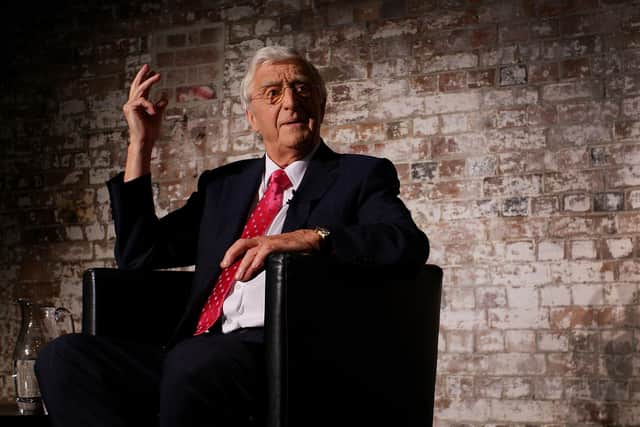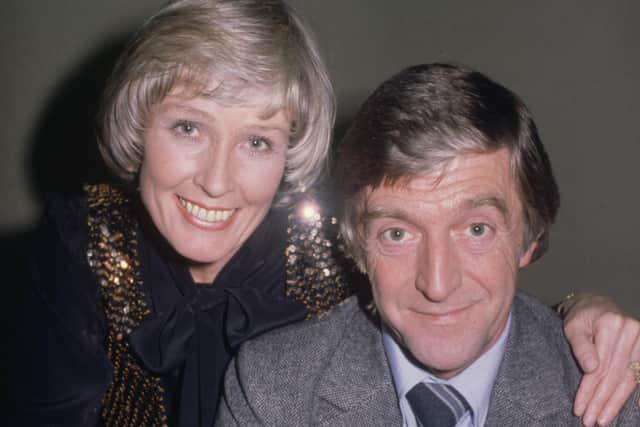Sir Michael Parkinson: Cricket writer, cineaste, radio host, king of the chat show and quintessential Yorkshireman
Cricket writer, cineaste, radio host and, of course, king of the chat show, he had been part of the cultural landscape for 60 years.
His death on Thursday at 88 brought to a close an era of television that began at Granada in the 1960s and took in some of the most memorable interviews ever to have been caught on camera.
Advertisement
Hide AdAdvertisement
Hide AdFrom Muhammad Ali to Rod Hull’s emu, there seemed to be no one with whom he had not crossed paths.


When he walked on to his set at Television Centre for that first show in June 1971 he had no idea it would be the making of him.
He had, he said, been happy to get through the show without falling down the stairs or forgetting the name of the guest sitting opposite.
His eponymous programme was just a 10-week filler for the summer schedule but both Parkinson and the BBC were keen that it should endure.
Advertisement
Hide AdAdvertisement
Hide AdThe corporation wanted a vehicle to emulate the success of the nightly Johnny Carson Show in the US, even though they recognised there were too few guests on tap to attempt doing it more than once a week. Parkinson was the man they thought could combine showbusiness with a journalistic edge that would see off any suggestions of dumbing down.


In the end there were more than 650 episodes and some 2,000 interviewees.
Parkinson was already a seasoned TV professional, having been a part of Granada’s local news team in Manchester. When the station opened a regional studio in Leeds it was Parky who delivered the headlines. And when Granada gave way to the new Yorkshire Television franchise in 1968, they asked him to supply the commentary on the opening documentary.
It had been Granada’s custom to put its producers on screen and let its presenters produce, so Parkinson had seen the medium from both sides of the screen. By the time he left for the BBC – initially to work on the nightly current affairs magazine, 24 Hours – he had hosted and produced the networked Cinema programme and lent his name to a raft of other shows.
Advertisement
Hide AdAdvertisement
Hide AdHe had also gained experience as an on-screen interviewer, on Thames TV’s afternoon show, Teabreak, where he was joined by his wife Mary, who later presented the programme in her own right.
Michael Parkinson was born on 28 March 1935 in Cudworth, near Barnsley. His dad, Jack, was a miner and when Michael was young he took him underground to show him the grim reality of life and deter him from ever wanting to follow in his footsteps.
But life “wasn’t terrible”, he said. “I had a happy, safe and secure childhood. It was a better childhood than many kids today could care to hope for, being safe and secure and playing freely in the street. And we were happy.”
He landed a place at Barnsley Grammar and in 1951 secured O-Levels in art and English language. He was a club cricketer, and both he and his opening partner at Barnsley Cricket Club, Dickie Bird, had trials for Yorkshire, along with Geoffrey Boycott. It was Parkinsin who kept Boycott out of the Barnsley team by scoring a century and 50 in successive matches.
Advertisement
Hide AdAdvertisement
Hide AdHe began an apprenticeship in journalism on the Barnsley Chronicle, covering what was then the cub reporter’s weekly lot of funerals and flower shows, but soon graduated to the Manchester Guardian as a features writer, alongside the future playwright Michael Frayn.
In between there was National Service, which saw him commissioned as an officer in the Pay Corps – the Army’s youngest captain at the time. Back home, the Daily Express doubled his salary to £2,000, and he was off to Fleet Street.
He was always torn between newspapers and TV. He was an early guest presenter of What The Papers Say and had a crack at hosting ABC of the North for Granada’s weekend counterpart, ABC Television. At the same time he had begun authoring a witty and long-running sports column for The Sunday Times.
Yet it is for his TV encounters that he will be remembered – not least the four he did with Muhammad Ali. The first came in 1971 and may be the most famous chat show interview in British TV history. Ali, who had been beaten by Joe Frazier in “the fight of the century” six months earlier, was at his brilliant and charismatic best, earning the applause of a rapt audience while discussing racism.
Advertisement
Hide AdAdvertisement
Hide AdThe final interview, 10 years later, now serves as a dreadful preview of the health problems that would plague Ali’s later life. After spending years taking destructive blows to the head, he appeared ponderous, slurring his words while attempting to answer questions about brain damage.
But Parkinson’s chat show career was not all plain sailing. There had been the unseemly wrestling match with “that bloody emu” and in 2003 came an excruciating interview with the American actress Meg Ryan, who appeared to want to be anywhere but there. He also had an awkward encounter with Dame Helen Mirren, whom he introduced as the “sex queen” of the Royal Shakespeare Company.
“Serious actresses can’t have big bosoms, is that what you mean?” was her response.
It wasn’t controversy but ambition that ended his golden era with the BBC. In 1983 he became one-fifth of the quintet that launched ITV’s first breakfast franchise, TV-am. Parkinson had been increasingly uneasy with his BBC show, and its expansion to two nights a week convinced him it was time for a change.
Advertisement
Hide AdAdvertisement
Hide AdBut it quickly became apparent that jumping ship was a mistake. Viewers deserted TV-am in droves and boardroom changes saw the departure of Anna Ford and Angela Rippon. Parkinson opted to stay and faced down accusations of having sold out. He and Mary, who co-presented the station’s weekend show, were gone years before the franchise ended.
He spent much of the rest of the 1980s in the TV wilderness, though he hosted a short series for Yorkshire TV, which included a notable exclusive with Elton John. He also made shows in Australia and presented quizzes like Thames’s Give Us A Clue.
His BBC TV comeback came in 1995 with a compilation series of clips from his original interviews. It led to the eventual return of his chat show in 1998 with a string of high-profile guests including Sir Anthony Hopkins and his favourite interviewee, Sir Billy Connolly.
In 2004, Parkinson left the BBC again and took his show to ITV. Once more, he regretted the move almost immediately but he remained on screen for three more years. In 2012 there was one last comeback, with a new series for Sky.
Advertisement
Hide AdAdvertisement
Hide AdKnighted in 2007, he would always cite Mary as the most important factor in his life – not least when she told him he was “ugly” when he was drinking.
“It was necessary, it was needed, it was required because like all drunks, you don’t see yourself as other people do,” he said.
She survives him, along with their three sons.